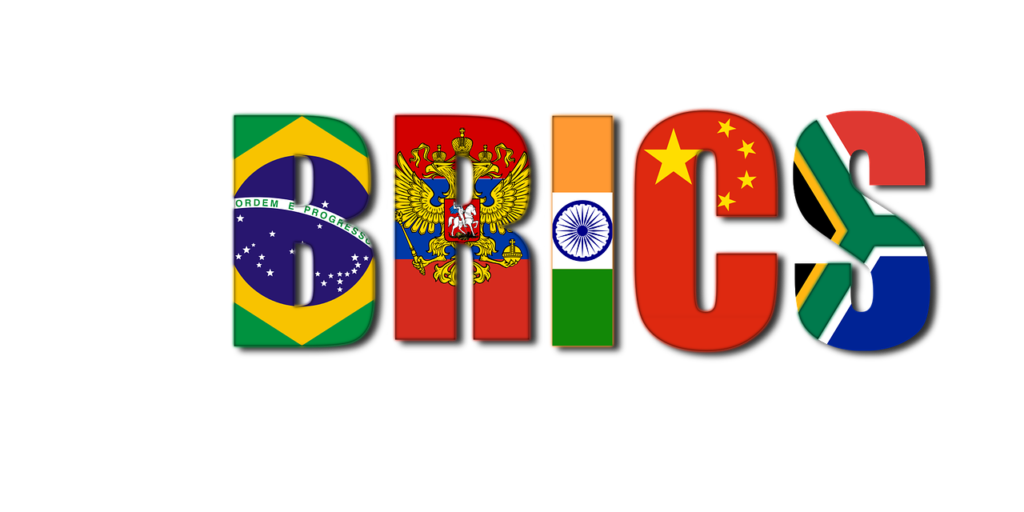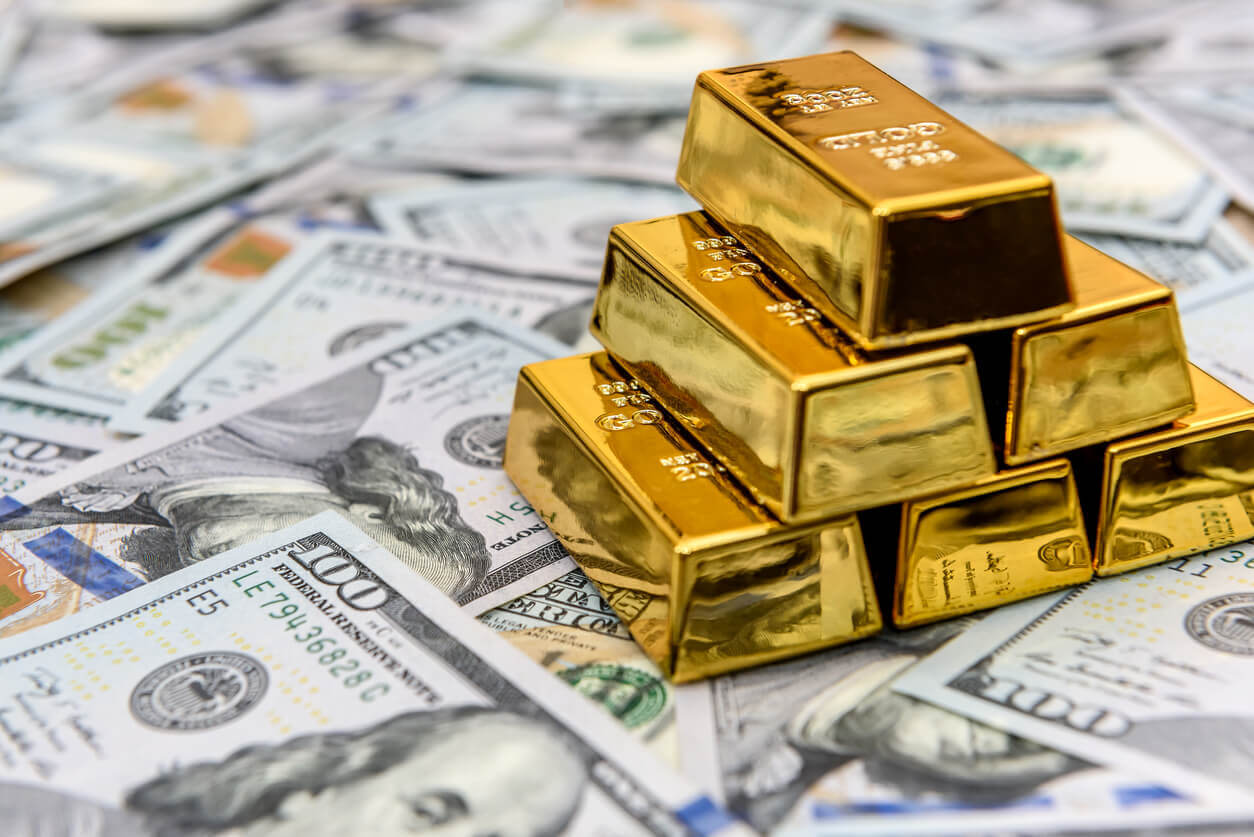Why do BRICS Nations Value Gold so Highly?
The major financial speculation for 2024 is the potential introduction of gold-backed currency by the BRICS nations. The 2023 summit in Johannesburg was seen as the platform on which the five-nation bloc would finally provide a blueprint for its proposed currency backed by the precious metal. The talk of new currency was entirely shunned, with the group focusing on accelerating the expansion of BRICs with the addition of 6 new countries. Even though the group did not discuss the highly anticipated subject publicly, it has a special predilection for gold. But why does BRICS value gold so highly?
BRICS Nations Quest to Knock the Dollar of its Perch
With more than 80% of global trade conducted in US dollars, and the dollar accounting for nearly 60% of international foreign exchange reserves, the currency’s dominance on global stage is indisputable now. Since the Russian invasion of Ukraine, the sanctions on Russia as a result, and tension between the United States and China, de-dollarization talk is taking unprecedented pace.
The BRICS countries have pursued a number of steps to lessen their reliance on the US dollar. In recent months – China, Brazil, and Russia – have embarked on the use of non-dollar currencies in their international transactions. In addition, Saudi Arabia, the United Arab Emirates, and Iraq (all new entrants to the BRICS alliance) are actively exploring alternatives to the dollar. Also numerous central banks have been seeking to shift a huge portion of their currency reserves away from the US dollar and into gold.
The BRICS countries have been vocal with their criticism of the American’s dollar dominance on the international transaction stage – for various reasons. For Russia, it is about the West’s sanctions and freezing its multi-billion-dollar reserves, while China has the labeled dollar’s dominance as the number one source of uncertainty and instability in the global economy. Beijing has even directly accused the Fed’s interest rate hike of causing disorder in the international financial market along with a huge depreciation of other nation’s currencies. China, together with the rest of BRICS, has also criticized the West’s use of sanctions as a geopolitical weapon.
To help assuage such problems, there are consistent rumors about the de-dollarization and potential introduction of a gold backed currency by BRICS.
Is Gold at the Heart of BRICS' Nations Plans?
Central to Russia, China, India, Brazil, and South Africa’s mission to cut greenback dependence is gold. Central banks around the world have been snapping up gold in 2023, but it is clear which ones are behind the stockpiling of gold – Russia, India, and China. Seeing Russia’s financial predicaments resulting from sanctions by the West, BRICS nations are aiming to reduce dependence on the U.S. dollar.
China’s central bank added a net 23 tonnes of gold to its reserves in June alone, making it an eighth successive increase. As of August 2023, the central bank of China holds roughly 2,330 tons of gold in its reserves. The precious metal stockpiling comes in the midst of the country’s effort to erode the global dominance of the dollar as well as reduce the impact of growing economic and geopolitical tensions.
Other central banks are buying gold too. In 2022, the demand for gold surged, and the pattern persisted until 2023. According to a report by the World Gold Council in May 2023, more than 60% of global central banks estimate that gold will consist of a greater portion of reserves in the next half a decade.
Separate research by the Official Monetary and Financial Institutions Forum found that central banks across the globe think there will be a sharp decrease in the greenback’s share to 53% in the next decade.

Why Do BRICS Nations Stockpile Gold?
BRICS countries may value gold as a tool for de-dollarization and protection against the effects of political tensions for several reasons, some of these include the following:
Store of Value:
Gold has been considered a store of value for centuries. It is not subject to the same kinds of inflation and currency fluctuations that fiat currencies are. BRICS countries might view holding gold as a way to preserve wealth in the face of economic uncertainties.
Diversification:
Holding gold in their reserves allows BRICS countries to diversify their holdings away from traditional assets like US dollars and bonds. This diversification can lessen their exposure to the potential hazards brought on by a reliance on one asset in particular.
Reducing Dependency on the US Dollar:
One of the key motivations for de-dollarization is to reduce dependency on the US dollar and its potential vulnerabilities. Gold is a global asset that can be used in international trade and finance without being tied to any specific currency, providing an alternative to the dollar's dominance
Geopolitical Hedging:
Gold can act as a hedge against geopolitical tensions and uncertainties. During times of political or economic turmoil, the value of gold often increases, making it a potential buffer against negative impacts.
Long-Term Stability:
Gold's value tends to be relatively stable over the long term compared to other assets. This stability can be appealing to countries seeking to protect their reserves against the volatility of financial markets and changing global economic conditions.
Prestige and Perception:
Holding a significant amount of gold can enhance a country's perception of financial stability and credibility. It can signal to the international community that a country has tangible and valuable assets backing its economy.
Global Monetary System Reform:
BRICS countries have expressed interest in reforming the global monetary system to make it more equitable and diversified. Gold could play a role in such reforms, potentially supporting the development of alternative international currencies or financial mechanisms.
Historical and Cultural Significance:
Gold has cultural and historical significance in many BRICS countries. It has been used as a form of wealth and adornment for centuries, and this cultural attachment might contribute to its value as a reserve asset.
What Do BRICS Nations Dollar Purchases Imply for Dollar Dominance?
BRICS' acquisition of US dollars could potentially weaken dollar hegemony, leading to the folowing possible outcomes.

Reducing Dollar Dominance:
BRICS nations might help lessen the dominance of the US dollar in the world financial system by buying fewer US dollars and diversifying their foreign currency reserves into other currencies and assets. As a result of this, the international monetary system might become more multipolar, thereby eroding the dollar's position as the main reserve currency.
If BRICS countries shift away from using the US dollar as the primary currency for international trade settlements, it could erode the dollar's importance in global trade transactions. This could lead to a broader adoption of other currencies, such as the Chinese yuan or Russian Ruble, for international trade, thereby challenging the dollar's preeminence.
Enhancing BRICS' Influence:
As BRICS countries collectively reduce their dependence on the US dollar, they might gain greater leverage in international economic negotiations. This could strengthen their bargaining power in matters such as global economic governance reforms, trade agreements, and financial regulations.
Reducing Vulnerability to US Economic Policies:
By holding fewer US dollars in their reserves, BRICS countries might become less vulnerable to changes in US monetary policy, interest rates, and economic sanctions. This could grant them more economic autonomy and resilience against potential adverse effects of US policy shifts.
Promoting Alternative International Payment Systems:
To facilitate trade among themselves and reduce reliance on the US dollar.BRICS countries might develop or enhance alternative payment systems that use their own currencies. This could accelerate the development of a parallel international payments infrastructure outside of the traditional SWIFT system, potentially weakening the dollar's control over global financial transactions.
Challenging US Financial Hegemony:
The accumulation of US dollars in foreign exchange reserves gives the US a certain degree of financial power and influence. If BRICS countries reduce their dollar holdings, it could challenge the leverage that the US wields over the global financial system and international markets.
Spurring Dollar Devaluation Concerns:
A significant reduction in demand for US dollars by BRICS countries could potentially contribute to a devaluation of the dollar. This could raise concerns about the stability of global financial markets and lead to increased efforts by the US to maintain the dollar's value.
Complex Transition Challenges:
Transitioning away from the US dollar involves challenges related to exchange rate stability, market confidence, and the practicalities of conducting international transactions using alternative currencies. These challenges could impact the pace and success of de-dollarization efforts.
Could the Dollars Dominance be Shaken?
The establishment of a gold-backed currency by BRICS countries has the potential to challenge the long-standing dominance of the US dollar. By anchoring their currency to physical gold reserves, the BRICS nations offer a sense of stability and intrinsic value that could attract global trust. Unlike fiat currencies, which are subject to central bank policies and geopolitical shifts, a gold-backed currency could provide a hedge against uncertainties, enhancing its credibility in international trade and finance.
This aligns with the growing sentiment among nations to diversify their foreign exchange reserves away from the US dollar, as reliance on a single currency for trade and reserves can leave nations vulnerable to fluctuations in US monetary policy and economic tensions. A gold-backed alternative offers a tangible and universally valued asset that could serve as a buffer against such risks.
What Could a BRICS Gold Backed Currency Mean Economically?
The introduction of a BRICS gold-backed currency by the BRICS alliance would spur a change to a more multipolar global financial system. As more nations seek to break free from the traditional dominance of the US dollar, the emergence of a credible alternative reserve currency could foster a sense of balance and equity in international economic affairs. This shift could empower BRICS nations and other emerging economies, giving them a stronger voice in shaping global financial regulations and policies.
The adoption of a new currency by the BRICS bloc could also accelerate the ongoing trend of de-dollarization, where countries seek to minimize their reliance on the US dollar in trade and investment. With a viable alternative at hand, more countries might be inspired to denominate trade deals in a potential BRICS currency or use it as a settlement currency for international transactions. This collective effort could gradually erode the dollar's dominance, fostering a more diversified and resilient international monetary landscape.
In addition to this, the introduction of a BRICS gold backed currency could ignite discussions about the need for comprehensive reform of the global financial architecture. The existing system, centered on the US dollar, has faced criticisms for its asymmetry and potential vulnerabilities. The emergence of a gold-backed currency could serve as a catalyst for reimagining a fairer, more inclusive international monetary system that better reflects the evolving economic realities of a multipolar world.
In Summary
The BRICS nations value gold highly, as evident by the current stockpiling by member nations. They see gold an ideal tool to potentially influence de-dollarization as well as a suitable asset for protecting their reserves against United States financial policies and global upheavals. Our analysis concludes that purchasing gold in large quantities by BRICS will only increase and stabilize its price in the coming years.
For information on how to invest in gold, take a look at our review of our top gold provider to buy gold.
